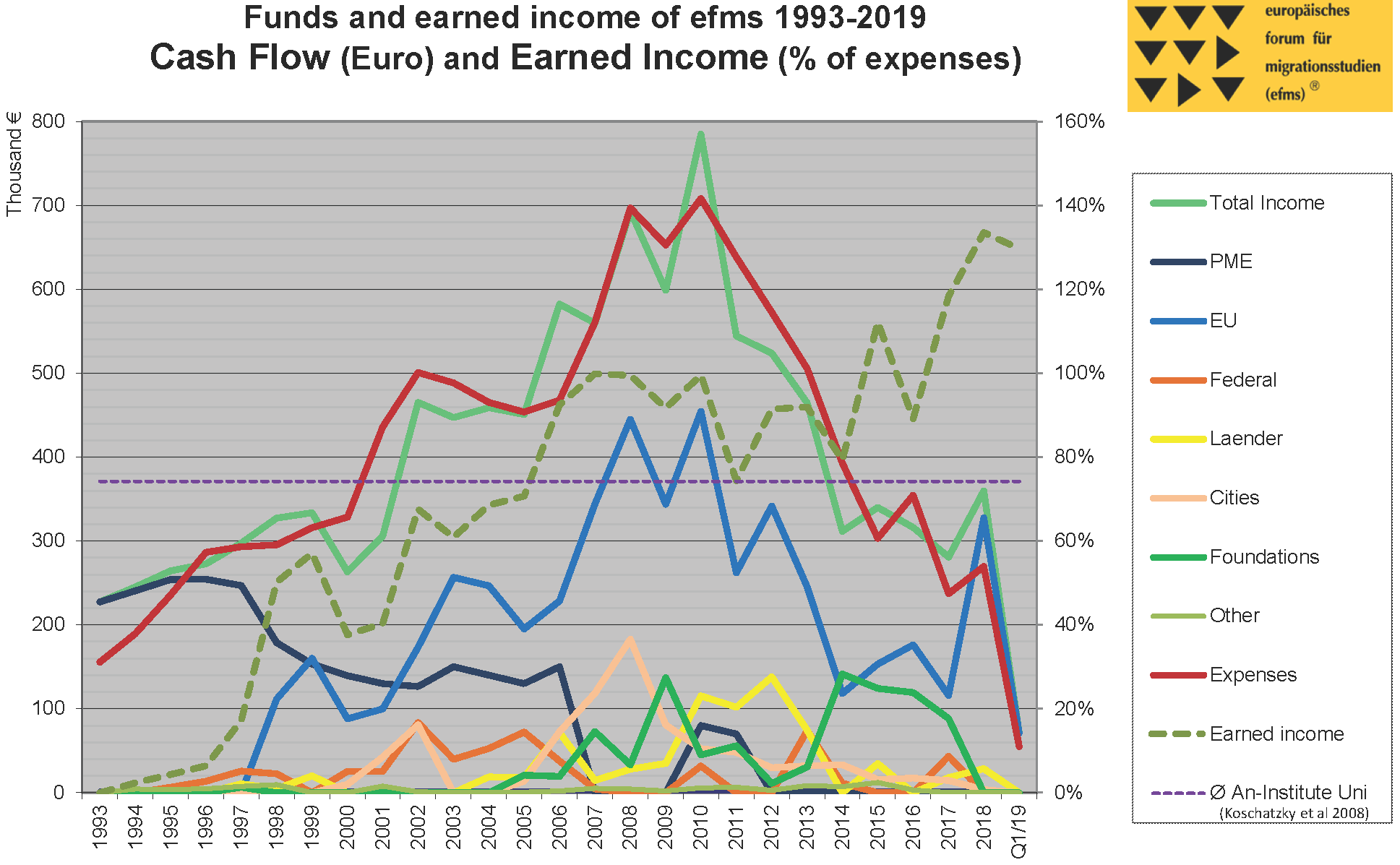
Background
Since its foundation in 1993 efms has continuously worked on migration and integration processes in Germany and Europe and has given policy advice. As a civil society non-profit association efms was able to raise more than 11 million Euros for its projects and pioneered in establishing an infrastructure for research in a highly relevant policy area in Germany. Through a large number of European and national research projects, publications, expert opinion papers, policy briefs, evaluation, conference and media contributions, and multitudinous public presentations, the efms left its marks on research and policy implementation.
To name only a few examples:
- The „Migration Report", a standard reporting instrument on the entire scope of migration-related developments in Germany has been developed by efms on behalf of the Federal Government of Germany.
- In the area of integration, we developed instruments for measuring and evaluating ongoing integration processes in various contexts and on multiple levels, both in Europe as well as in Germany. A pioneering work has been a recent study in cooperation with the Bertelsmann Foundation, the
 efms Diversity Monitor on comparative monitoring of diversity policies in all 16 German Laender. efms Diversity Monitor on comparative monitoring of diversity policies in all 16 German Laender.
- The efms had a leading position in developing tailored integration concepts for municipalities of various size, ranging from Frankfurt/Main to Dietzenbach, an integration crisis area in the Rhein/Main region during the nineties.
- In particular during its initial period in the early nineties, efms focussed on studies and recommendations for a reform of the German naturalisation and citizenship law. For „neue Deutsche“ („new Germans“) - as a book on this topic published by efms had been titled - , but also for fostering a learning process among the „alten Deutschen“ („old Germans“), we developed a concept for naturalisation ceremoniess as component of a naturalisation culture in Bavaria, and we contribute up to the present to these in Bamberg.
- The education of children with a migration background (children of international migrants, CIM) in Europe and Germany, recently in particular the education and training of young refugees and children from refugee families, has been a topic of several efms research projects and and policy recommendations.
- Books on migration theory, on integration processes and on the early European migration policy have become standard works in their respective areas.
- Emerging from efms, at the University of Bamberg, a major field of study on migration and integration has been developed for the the curriculum of the MA in Sociology. In recent years, efms developed two on-line learning modules on integration processes and integration policies for the Bavarian Virtual University (VHB); these modules are taken by students from many universities across Bavaria.
- A large number of students and young researchers has been able to expand their professional qualifications by working in efms.
For many years, the project-funded work of the institute had been supported by a generous complementary funding from the foundation Population, Migration and Environment (PME), which ended in 2011. The foundation has not been able to continue such support for a longer period and has meanwhile closed down its entire activities. The previous board of directors of the non-profit association responsible for the institute has been strongly committed to acquire new core funding for the work of the institute. These efforts have been intensively continued by the successing board members and the managing director of efms. They have been supported for this endeavor by many, but in the end could not convince in particular the Bavarian state government to provide an institutional core funding for efms, even though the Bavarian Ministry of Scieces in a letter to the institute of February 28, 2019 had asserted “that the institute is a well connected, highly qualified and experienced research organization”.
It has been our experience that the Bavarian State Government simply lacks sympathy for the topic of migration, and sees it only as a problem. This is probably a consequence for its long time denial of an immigration situation in Germany. Against this background it does not seem possible to see the opportunities that migration and integration entail.
Experts know that it is not possible for a research institute to live on project funds alone for a longer period of time. After a final decision of the ministry not to grant infrastructure funding the board of efms decided to stop the work of the association and the institute.
During the last 26 years we have cooperated with many partners, including among others EU institutions, research institutes, foundations, federal and local governments and municipalities. We want to thank them for their confidence and cooperation.

 (1) Prof. Dr. Knut Koschatzky (2012): Stand und Perspektiven von An-Instituten an Hochschulen. Competence Center Politik und Regionen, Fraunhofer-Institut für System- und Innovationsforschung ISI, Karlsruhe. Tagungspräsentation "WERKSTATT Zukunftsaufgabe An-Institut", see page 11 on the financing of Institutes at a University in Germany. (1) Prof. Dr. Knut Koschatzky (2012): Stand und Perspektiven von An-Instituten an Hochschulen. Competence Center Politik und Regionen, Fraunhofer-Institut für System- und Innovationsforschung ISI, Karlsruhe. Tagungspräsentation "WERKSTATT Zukunftsaufgabe An-Institut", see page 11 on the financing of Institutes at a University in Germany.
|






